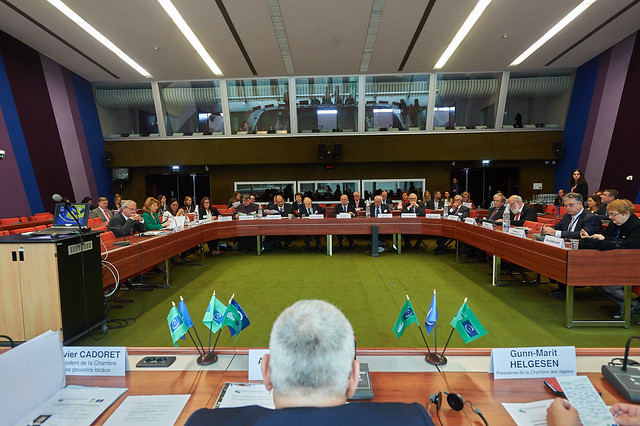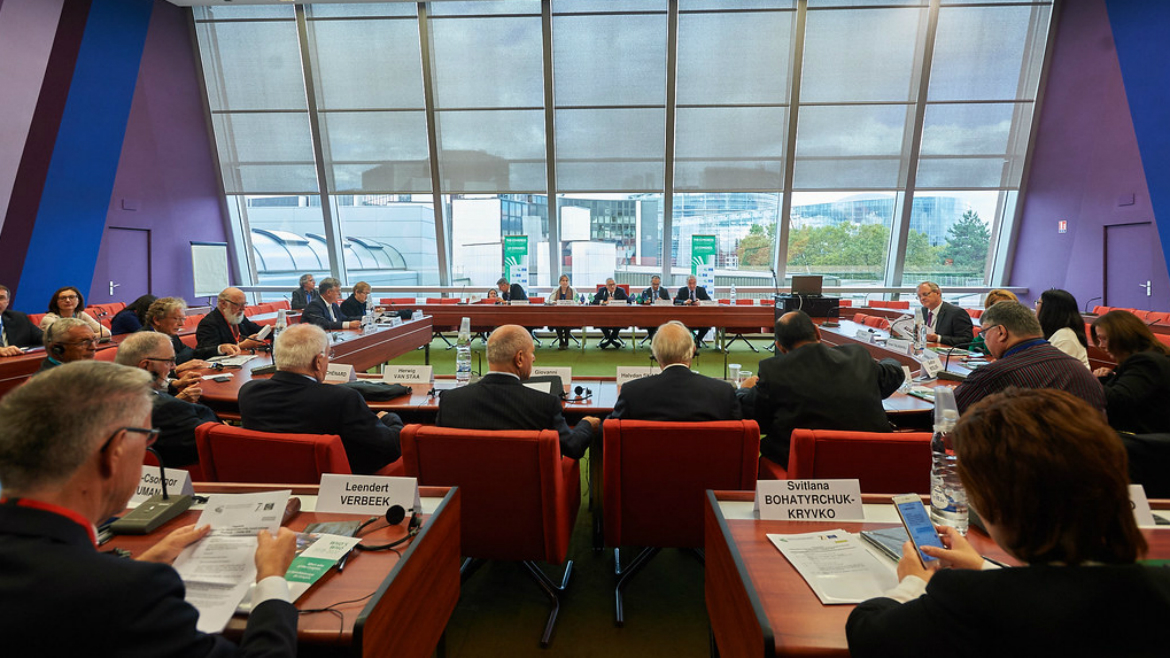Nine former presidents of the Congress, who met in Strasbourg during the celebration of the 70th anniversary of the Council of Europe, spoke to its current leadership about the Congress’s major achievements in promoting local and regional democracy and also about the threats to its future, in particular in terms of its resources and place within the Organisation.
The Congress, which took over from the “Conference of Local and Regional Authorities” set up within the Council of Europe in 1957, was established in its current form and under its current name in May 1994: Alexander Tchnernoff, a Dutchman, was its first president until July 1996. Like his successors present at the meeting, he expressed his “joy” at participating in the event and pointed out that “the struggle for local and regional authorities has not changed” and that the Congress remained the third pillar of the Council of Europe, despite the insufficient resources put at its disposal. For his part, Claude Haegi, the Swiss man who succeeded him from July 1996 to May 1998, called on the Congress to act in a more “visible” manner to tackle the challenges related to climate change at local and regional level, especially since local and regional elected representatives had been among the first to address these issues, at a time when hardly anyone was talking about them.
Herwig van Staa (Austria), who was the only president to hold the office twice, from 2002 to 2004 and then from 2012 to 2014, stressed the importance of the European Charter of Local Self-Government, while Giovanni di Stasi (Italy), who was president from May 2004 to May 2006, said that there should be “a Congress within the European Union” to find local solutions to the crisis of democracy. Gudrun Mosler-Törnström (Austria), who was the first woman to preside over the Congress, from October 2016 to November 2018, welcomed its “bottom-up” approach and stressed the importance of making democracy a reality through action on the ground.
For their part, Halvard Skard (Norway, president from May 2006 to May 2008) and Keith Whitmore (United Kingdom, president from October 2010 to October 2012) pointed out the great contribution which the Congress’s action and instruments had made to strengthening local democracy in Europe, with Mr Whitmore mentioning, in particular, the success of the European Local Democracy Week. Lastly, Alain Chénard (France, president from May 1998 to May 2000) wished the Congress a long life, while Ian Micallef (Malta, president from March 2009 to October 2010) paid tribute to Jean-Claude Frécon, the French president of the Congress who passed away at the end of 2016, shortly after the end of his term of office from October 2014 to October 2016. Gaye Doganoglu (Turkey, EPP/CCE) moreover reminded those present of the work done by Yavuz Mildon (Turkey), president of the Congress from May 2008 to October 2010.
Congress to write to Council of Europe Secretary General
The suggestion of conveying a message to Marija Pejčinović Burić, the new Secretary General of the Council of Europe, made by Alexander Tchnernoff during the discussions, was welcomed by all the,participants. In particular, the text will have to point out the essential role of the Congress for local and regional democracy and encourage the Secretary General to give it the means to implement its political priorities.
Although the current and former heads of the Congress stressed its expertise and the relevance of its action, it is nonetheless confronted with a lack of resources, as Anders Knape (Sweden, EPP), the current president, noted with regret.
More and more local elected representatives subjected to threats and intimidation
Anders Knape expressed particular concern about the increase in the number of threats made against local elected representatives in several countries, a development that the Congress should be able to address…but it was being held back, despite its powers and expertise, due to a lack of financial resources. This increase in threats against local elected representatives was all the more worrying since it could discourage citizens and local elected representatives from standing for election or re-election. For his part, Thomas Andersson (ILDG, Sweden) mentioned the case of one of his colleagues who had resigned for this reason. Gunn Marit Helgesen (Norway, EPP/CCE), President of the Chamber of Regions, noted that even in her country, which was renowned for its peacefulness, hate speech was on the increase, in particular against elected representatives, women and young people, and pointed out the extent to which “the existence of the Congress is crucial”, including in view of these trends.
Lastly, going back to the issue of the difficult relationship between citizens and political institutions, Pietro Fassino (Italy, SOC) also emphasised the “essential role played by local authorities in strengthening democracy”. In the area of monitoring local democracy, Leendert Verbeek (Netherlands, SOC), citing the monitoring reports as an example, added that “the quality of the Congress’s work and the number of those who follow it are both increasing steadily, thereby forming its greatest assets”.
See also:
- Seminar on the Congress’ history and achievements
- News: "Congress President meets the President of the French Republic"
- News: "Former Congress presidents exchange views with the current Bureau"
- News: "Former Congress presidents’ message to the Secretary General of the Council of Europe"
- News article on the Seminar on the Congress’ history and achievements
- Monitoring of the European Charter of Local Self-Government
- Observation of local and regional elections
- Flickr Gallery





